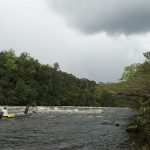A conference report on CCSI’s Conference on “Climate Change and Sustainable Investment in Natural Resources: From Consensus to Action” is available here, and a shorter outcome document , which was disseminated at COP22, is available here. These documents summarize the discussions at the eleventh annual Columbia International Investment Conference, which took place on November 2-3, 2016, at Columbia University…. read more
Date: November 2-3, 2016, 8:30am-5:00pm (Nov 2); 8:30am-6:00pm (Nov 3)
Location: Faculty House, Columbia University, New York

By Stephen Brooks
October 27, 2016
In this blog post, Stephen Brooks explains how strong institutions, laws, and policies are critical to ensuring that the destabilizing effects of climate change don’t impinge on the rights of local populations. As climate change continues to pose a significant threat to the poorest citizens and puts strain on government systems, it is critical to recognize that the push to reduce emissions and switch to clean energy sources intersects with securing land and resource rights for impacted communities.

By Alejandra Cicero and Jesse Coleman
October 24, 2016
In this blog post, Alejandra Cicero and Jesse Coleman give numerous examples —Pakistan, the Netherlands, the Philippines, and others—that illustrate how climate action depends on regional, domestic, and international engagement. With strong and coherent jurisprudential narratives on legal responsibility for climate change, there is potential for success in influencing private sector action.
Date: October 20, 2016 12:10-1:00pm
Location: Columbia Law School, Jerome Greene Hall, Room 807

By Romany Webb
October 19, 2016
In this blog post, Romany Webb writes on the debate between industrialized and developing countries over the use of patents on technology that addresses climate change. To achieve the Paris Climate agreement’s goals and the Sustainable Development Goals, action should be taken to remove impediments in international treaties.

By Sam Szoke-Burke and Kaitlin Cordes
October 17, 2016
In this blog post, Sam Szoke-Burke and Kaitlin Cordes explain how the diversion from fossil-fuel based energy to renewables must be done responsibly with governments, financiers, and energy companies complying with international best practices to ensure that land rights and human rights are respected.

By Peter Veit and Helen Ding
October 10, 2016
In this blog post, Peter Veit and Helen Ding examine how “tenure-secure” indigenous lands generate billions, sometimes trillions, of dollars’ worth of benefits in the form of sequestration, reduced pollution, clean water and more. Despite the obvious benefits, governments’ legally recognize ownership of 20 percent of the lands that indigenous peoples and other communities hold and manage.

By Jesse Coleman and Kaitlin Cordes
October 10, 2016
As food systems become increasingly globalized, and commodity markets more complex, policymakers face the ever more difficult task of identifying and addressing multiple risks to food security. One risk that has largely escaped attention in global food policy discussions is the potential for high-frequency trading to exacerbate commodity market volatility, with corresponding negative impacts on the world’s hungry.

By Kaitlin Y. Cordes
September 22, 2016
In this blog post, Kaitlin Cordes discusses how land plays a complicated yet crucial role in the search for equitable climate change solutions. Land impacts relating to resource investment need to shift so that they are always responsible and sustainable.










